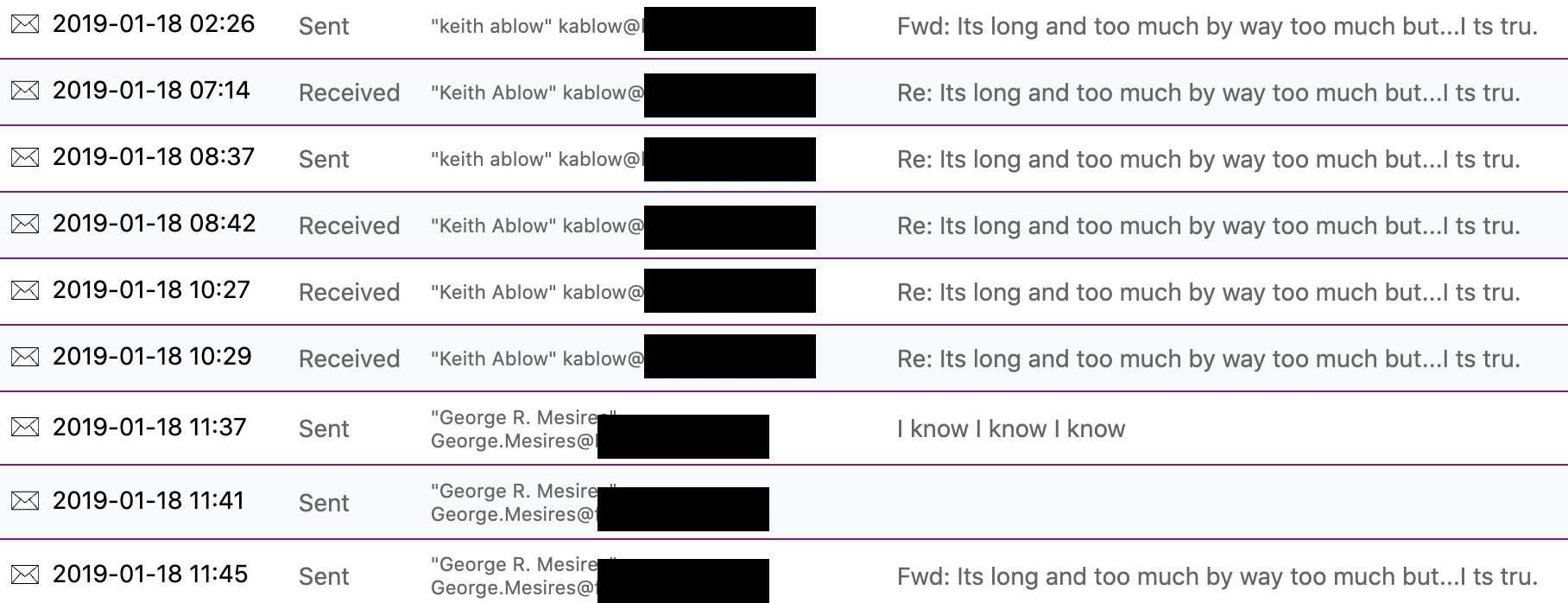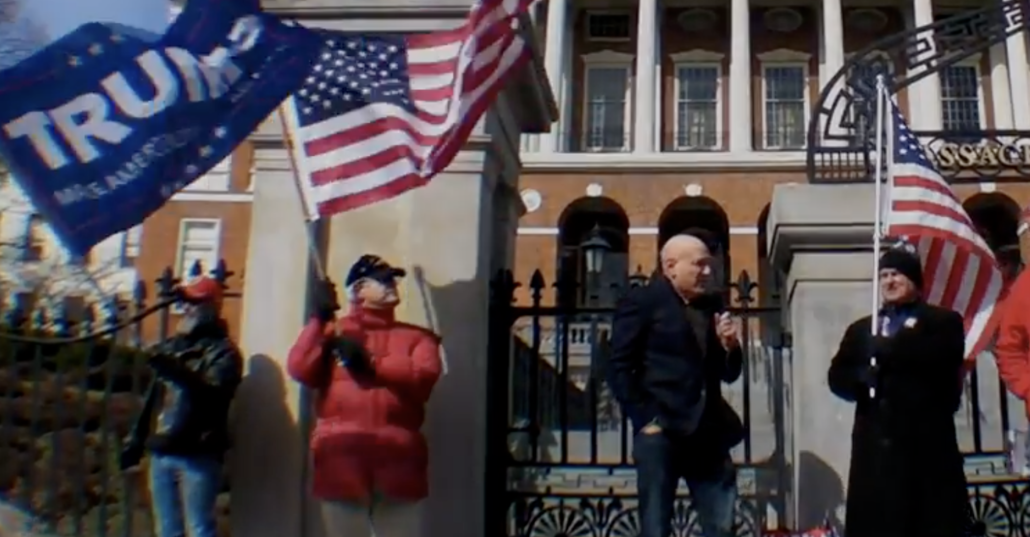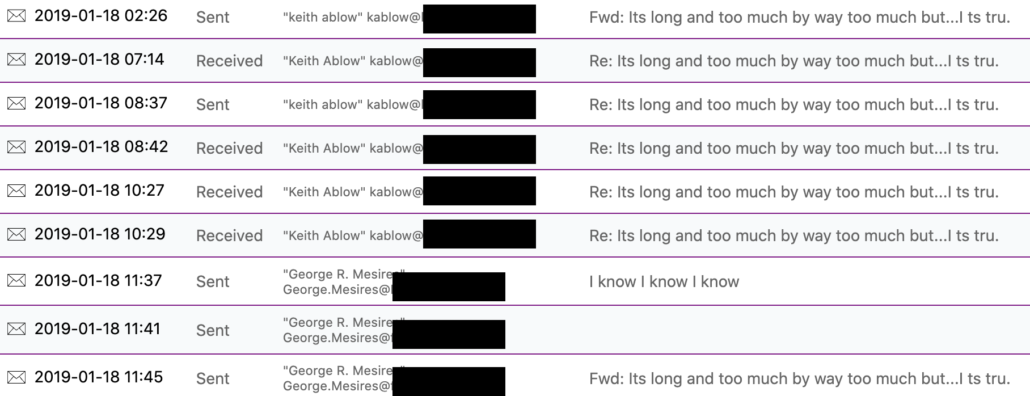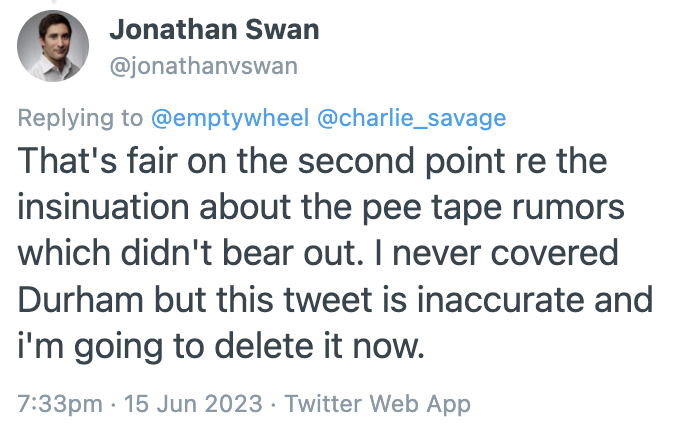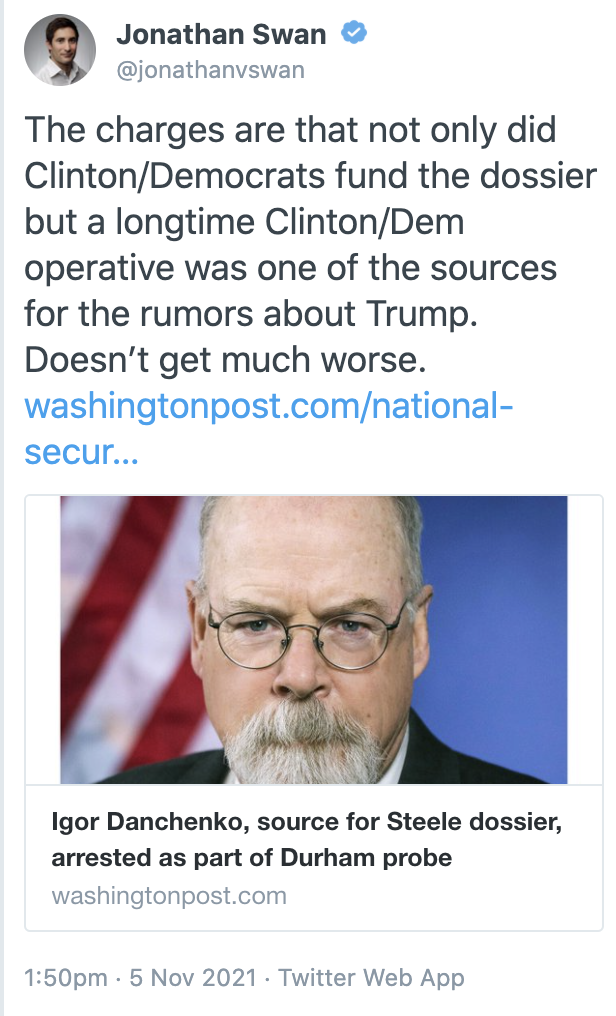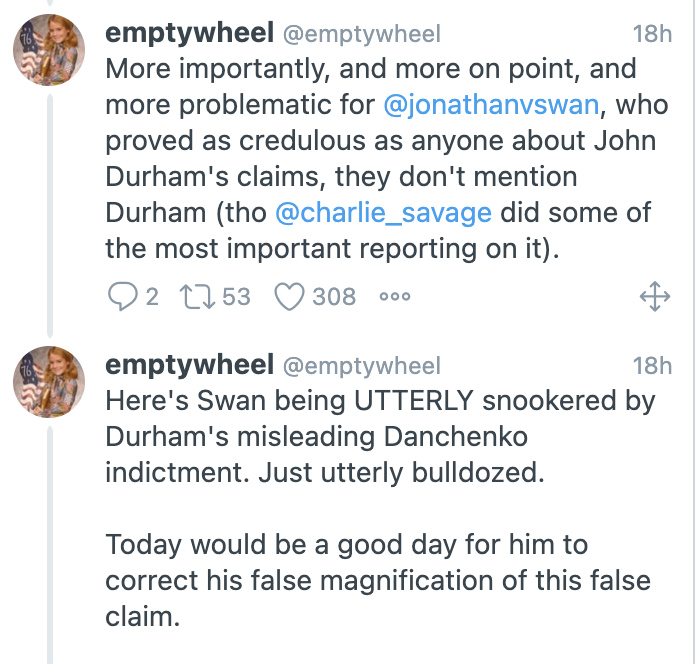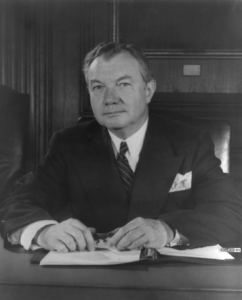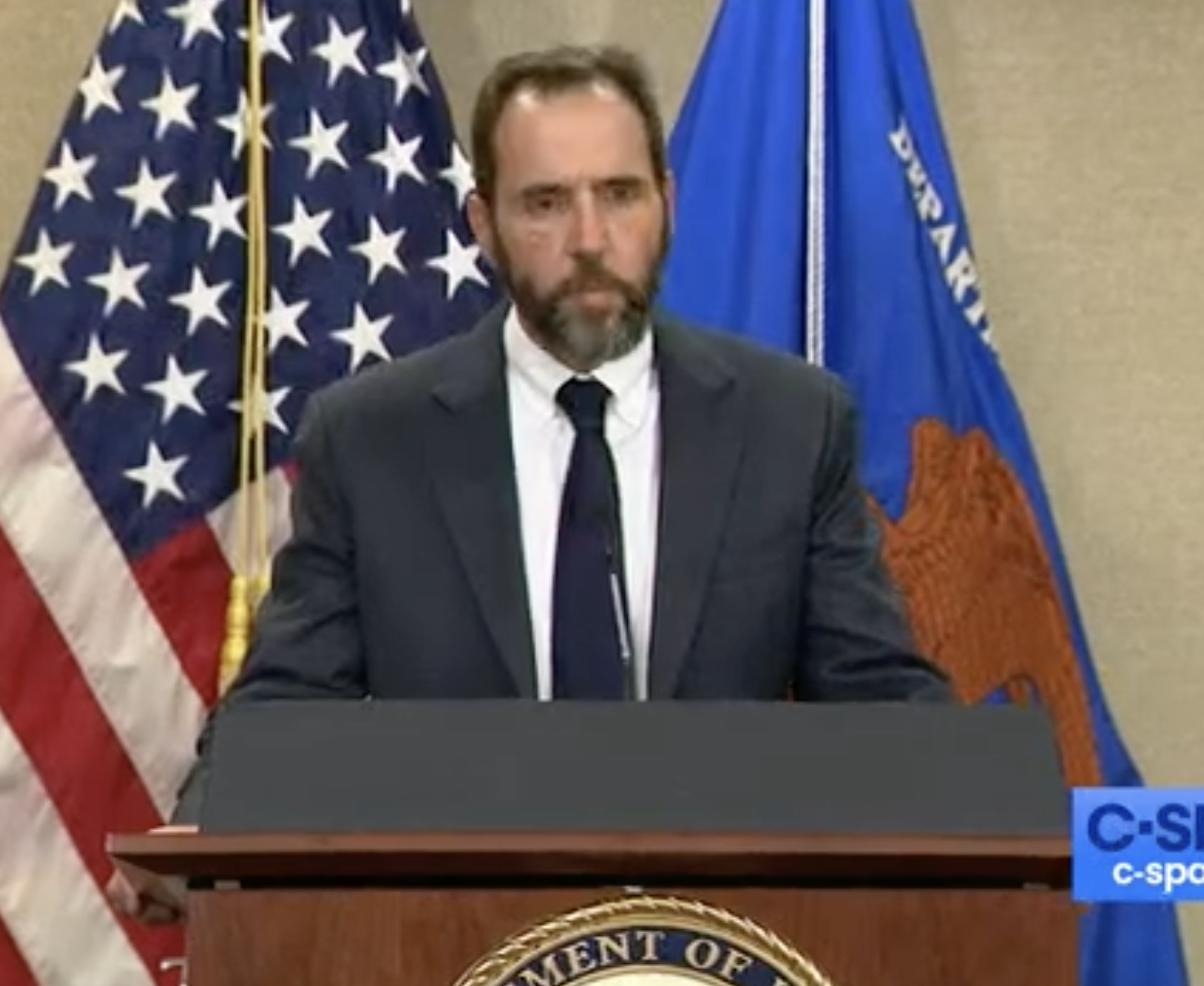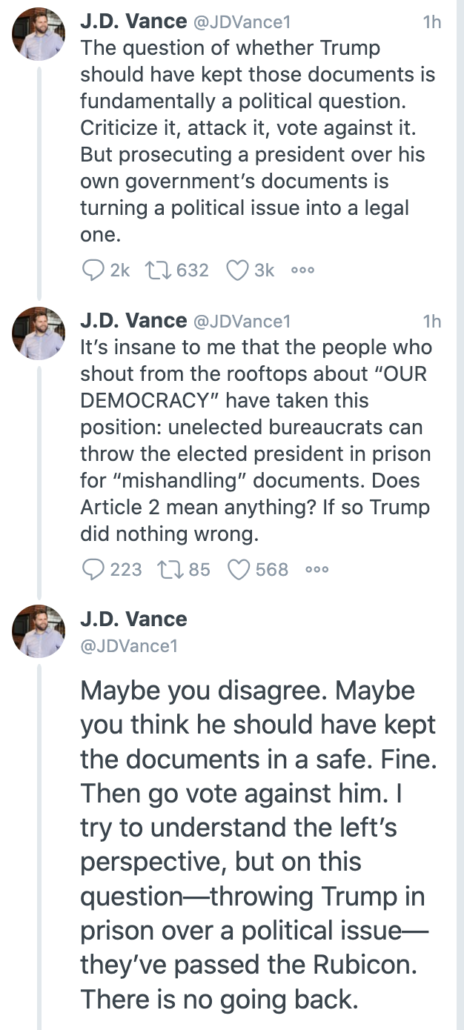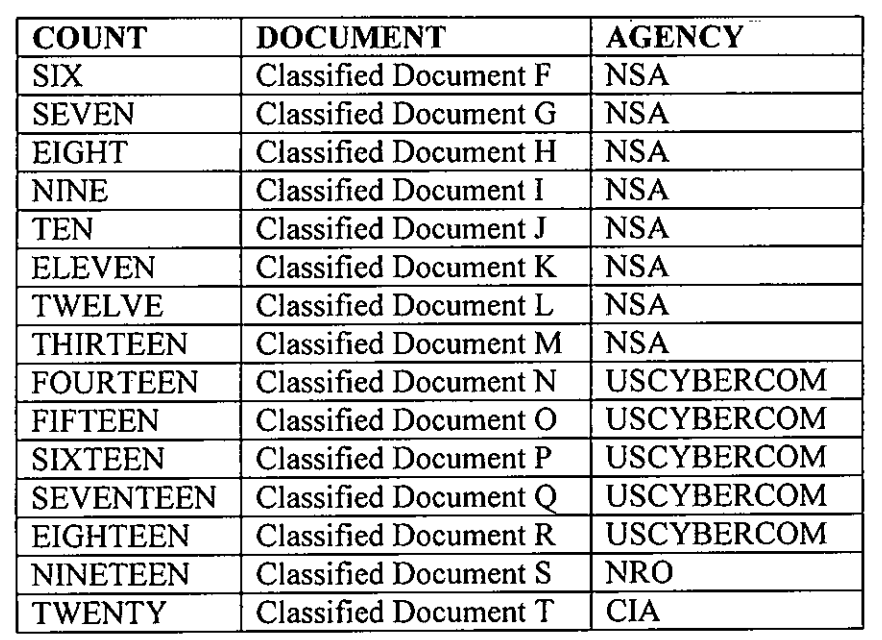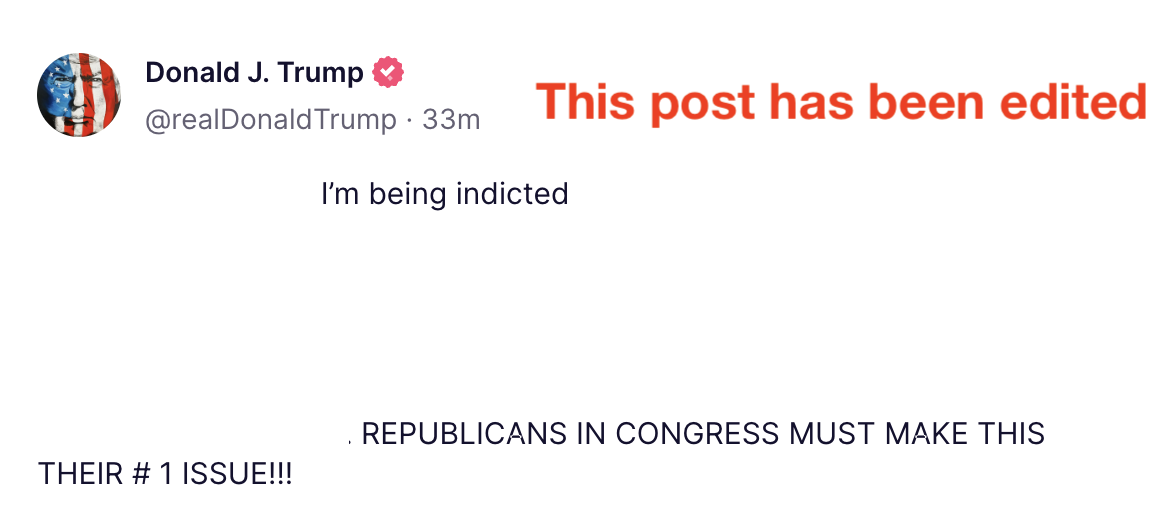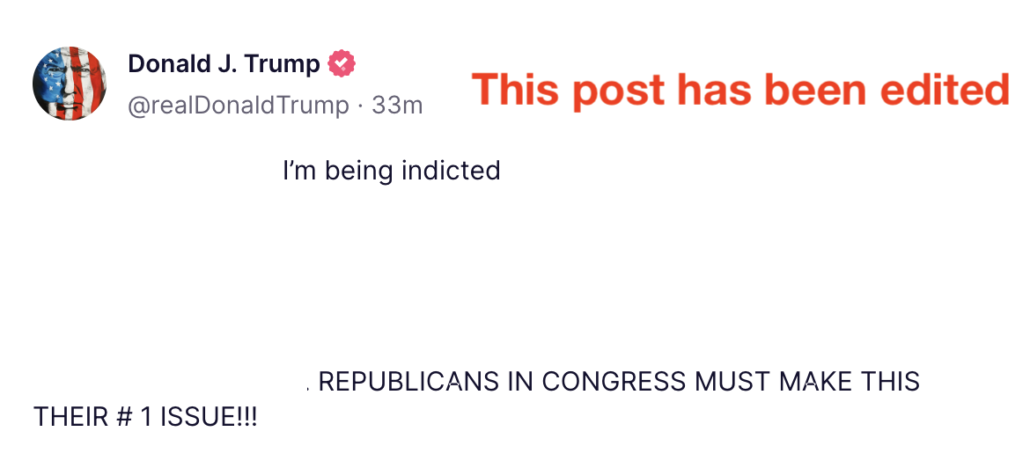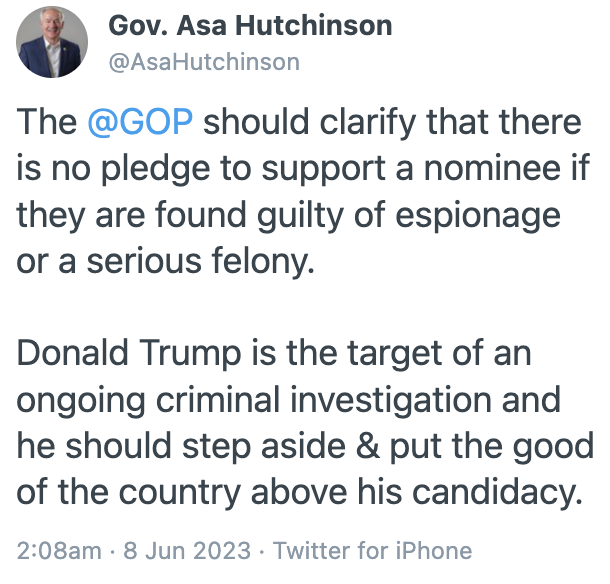Keith Ablow’s Unallocated Space in Hunter Biden’s Memory
In the third part of Gus Dimitrelos’ report* on the laptop attributed to Hunter Biden, he examines what he could find in the unallocated space of the laptop — the place where deleted files go on computers until they eventually get written over. He does it, in laymen’s terms, to prove that there was someone at the keyboard of the laptop, deleting individual files by hand, which he claims (falsely) is proof that, “Robert Hunter Biden is in control of the MacBook Laptop.”
He shows remarkably little interest in what got deleted.
At least two of the files deleted from the laptop pertain to the therapist from whom the President’s son was getting Ketamine treatment during the period his digital life appears to have been taken over, Keith Ablow, and in whose office the DEA discovered a different laptop owned by Hunter Biden in 2020.
According to two people familiar with the matter, a different Hunter Biden laptop landed in the custody of the DEA in February when they executed a search warrant on the Massachusetts office of a psychiatrist accused of professional misconduct. The psychiatrist has not been charged with a crime.
Hunter Biden was not a target of the search or the investigation, and his lawyer ultimately got his laptop back. It’s not clear why his computer was left in the doctor’s office.
Who is Keith Ablow?
One enduring mystery about the “Hunter Biden” “laptop” affair is why the son of a top Democrat ended up doing Ketamine therapy with a Fox personality just weeks short of allegations that the shrink had sexually harassed patients, an accusation that would lead to his suspension.
Ablow’s career on Fox extended back years by the time in 2018 when Hunter Biden got involved with him. He made obnoxious comments both about the Obamas and marriage equality and a ludicrous pitch in favor of Newt Gingrich. There’s no reason a Democrat should ever have trusted him.
And then, shortly after the time when Hunter Biden’s digital world appears to have been taken over by his droidhunter Gmail, several lawsuits accusing Ablow of sexual harassment went public.
The women allege that Dr. Keith Ablow, an author who was a contributor to Fox News network until 2017, abused his position while treating them for acute depression, leaving them unable to trust authority figures and plagued with feelings of shame and self-recrimination.
“He began to hit me when we engaged in sexual activities,” wrote one plaintiff, a New York woman, in a sworn affidavit filed with her lawsuit. “He would have me on my knees and begin to beat me with his hands on my breasts,” she wrote, “occasionally saying, ‘I own you,’ or ‘You are my slave.’”
The malpractice lawsuits, two of them filed on Thursday in Essex Superior Court and a third filed last year, paint a picture of a therapist who encouraged women to trust and rely on him, then coaxed them into humiliating sexual activities, often during treatment sessions for which they were charged. When the New York woman had trouble paying her therapy bills, she said, Ablow advised her to work as an escort or stripper because the work was lucrative.
The three lawsuits were settled. But as a result Ablow’s medical license was suspended. As noted above, for some reason the DEA searched his office a year later, where they found yet another Hunter Biden laptop left behind.
Update: Here’s a picture of Ablow speaking at a Trump rally in MA on March 4, 2017.
Deleting Ablow
In fact, the accusations against Ablow were one of two things that Dimitrelos found in the unallocated space of what would have been the laptop.
On February 25, 2019, Hunter Biden texted someone else a link to the BoGlo report on the accusations, which had been published four days earlier. “My psychiatrist,” Hunter Biden explained in a follow-up text. “I can’t catch a break,” he said in the third. If authentic, these texts appear to capture Hunter’s immediate response to the abuse allegations, and the four-day delay in his discovery of them.
That someone would delete those is interesting enough.
But I’m far more interested in the other file Dimitrelos found. It was a December 10, 2018 invoice, sent by iChat. It reflected the following psychotherapy sessions with Hunter, which were identified as “New Incident”:
- November 10, 2018: 90 minutes
- November 11, 2018: 90 minutes
- November 12, 2018: 30 minutes
- November 14, 2018: 60 minutes
- November 14, 2018: 60 minutes
- November 15, 2018: 60 minutes
- November 16, 2018: 60 minutes
It was a three page invoice, but Dimitrelos only shows the first page, so there could be more sessions in the weeks between November 16 and December 10, 2018. All sessions were paid by credit card within days.
But even just that single page shows that Hunter was spending time with Ablow in the period when he obtained new devices — including the laptop believed to be the one that ended up in John Paul Mac Isaac’s shop.
It’s easy to see, then, how and when Ablow might have come into possession of a Hunter Biden laptop and Hunter Biden might have started using the new one that would end up becoming a big political hit job.
[Update: I corrected my timeline here. Hunter Biden started using the laptop believed to be the one brought to Mac Isaac’s shop in October, not November.]
Baystate or Bluewater
Dimitrelos says the invoice, “correlates [with] email communications with Keith Ablow and the Practice Manager.”
But the invoice doesn’t. It differs with the emails we see with Ablow and his practice manager, a woman named Tiffany Bartholemew, as they appear in the BidenLaptopEmails dot com collection, in at least one key respect. The bill is from “Bluestate Psychiatry.” But Bartholomew writes from “Bluewater Wellness.”
The discrepancy may arise from a difference in treatment: and therefore also payment schemes. Of the emails related to Ablow sent by Hunter, about a dozen had to do with accommodations, including:
- Emails Bartholomew sent on December 4, 2018 (and so before the invoice) about payment for “this week” at Plum Island Rental
- The confirmation for that reservation, sent the same date as the invoice, to the rhbdcicloud and cc’ed to Bartholomew, followed by one sent on January 3, not cc’ed to Bartholomew, providing instructions for getting in
- An email sent on January 26 from the “manager of Dr. Ablow’s cottage”
- Seven emails from a guy who seems to have made himself Hunter’s Chief of Staff at a meeting on January 24, all of which pertain in part or in whole to finding a new place in Newburyport, MA
Those were all sent to the rhbdcicloud. Another email from Bartholomew, sent to the same email, alerted Hunter to a rescheduled Yoga session while in Massachusetts.
There were several other more curious emails involving Bartholomew:
- An email sent on January 5, 2019 to rhbdc at me.com, seemingly asking Hunter for advice about how to deal with an insane temp leaving adverse reviews on Google
- An MP4, dated January 8, 2019, titled Neverending story, sent first via Google Drive from a Gmail account, then forwarded the next day from her Ablew email account, both times to the rhbdcicloud
In this same period, Hunter paid someone with the last name Bartholomew but a different first name, via Venmo, for purchases at CVS, using his rhbrspdc account.
Guys are you getting my emails?
But several of the emails demonstrate Hunter’s communication woes during this period.
The very first email from Hunter Biden to Ablow in the Marco Polo set, sent on January 3, 2019, was misaddressed, and bounced. It was sent again, with the subject line “yyyy.”
While no body of that text appears in the Marco Polo set, Ablow responded to it, adding a third person, Rock, and asking for help getting a doctor to review Hunter’s daughter’s x-rays from a bad skiing accident.
Hunter responds, saying he is attaching the x-rays (and reply emails show jpg attachments):
I am attaching the X-rays and would so much appreciate your helopmputting [sic] them in the right hands.
Hunter and Ablow exchange two emails among themselves.
Then Ablow responds to his own email, which this time is marked [External], noting that “His [apparently meaning Hunter’s] email is screwed up,” and then saying he had texted Rock.
From: Keith Ablow <kablow[redacted]>
Sent: Thursday, January 3, 2019 11:40 AM
To: Positano [redacted]; rhbdcicloud
Subject: [EXTERNAL]Re: From KeithCAUTION: External Email.
Rock
His email is screwed upI texted you
The doctor responds — happy to help — and provides his contact. Ablow thanks him. Hunter responds to that, plaintively,
Guys are you getting my emails?
And though neither of the external interlocutors ever said a thing directly to Hunter, Ablow says, yes, suggesting they had gotten his emails, then instructs Hunter to contact the doctor and “send him the x-rays,” even though in the original email Hunter already sent 2 jpgs.
Hunter then tried to email the doctor directly, using the same email included in Ablow’s email (possibly even using the link from the doctor’s own email), and it bounces, “RecipientNotFound; Recipient not found by SMTP address lookup.”
At least based on the Marco Polo set, Hunter Biden didn’t send much between then and January 15 (though I may return to what he did send; he had important exchanges with his lawyer George Mesires).
Then he had another communication failure with Ablow’s team, though apparently of a different type.
On January 15, 2019 at 11:13AM, Hunter sent Ablow’s practice manager, Bartholomew. an email from his droidhunter account, asking “Schedule?” The email itself appears in the MarcoPolo collection, but any other body of the email is not preserved.
Bartholomew responded, on January 15 at 11:19PM, to the droidhunter account, describing his schedule for both “today” (seemingly meaning January 15) and “tomorrow,” his Ketamine treatment on January 16.
Then, just under 3.5 hours later, she sent that same email again, to both the droidhunter and rhbdcicloud with the message:
Below is the response I sent within minutes of receiving your email.
I called you this morning
Both Keith and I texted – I, multiple times, both on the group text and solo
I tried calling
I had Jodi text and call and you did not answer until 2pmI texted you after sending the below email and mentioned adding yoga on for tomorrow – I did not receive a response and I will not waste people’s time booking them if you do not stay in touch
Bartholomew appears to have attributed this to Hunter’s mental struggles, and it may well have been (though it is notable since it is the sole exchange with her involving the droidhunter email).
The reason people love my Dad Chris iOS because he’s the son they hope to raise
The questions about whether Hunter was communicating externally — to say nothing of the effect of the Ketamine treatment, which by context would have been January 16 — makes me really uncomfortable with what happened with a statement Hunter Biden shared for this Vanity Fair story on whether Hunter’s problems were leading Joe to hesitate about running.
The exchange starts with Hunter forwarding an email he sent to Doug Brinkley on his rosemontseneca email to Ablow, using his rhbdcicloud email, with his long and very rough draft of a statement.
Ablow asks if he wants edits.
I could also make a few other edits, with humility. Would you like me to?
Hunter responds by saying it needs both edits and to be more concise. So Ablow promises to do it overnight.
I can make it all happen by 8 am.
Not to worry.
This is my thing.
Stay tuned.
As that exchange was happening, Hunter sent the statement to his lawyer, George Mesires, via his rhbdcme address. Mesires responded saying, “I can’t stop crying,” but providing no edits.
Hunter sends two snide comments to the journalist to his attorney George Mesires, from the rosemontseneca email, ccing Ablow.
Then ultimately he sends the statement as rewritten by Ablow to Mesires.
“FIXED A FEW OF MY TYPOS . . .” Hunter said of the statement substantially written by Ablow. Mesires would have no way of knowing that Ablow had made all the changes.
Vanity Fair removed one paragraph about Hunter’s own background as well as this significantly edited snide comment to him:
I hope that answers your question, Chris. I would ask this one of you: Are your talents best used as a tabloid journalist? If you were willing to endure more pain to make a more powerful contribution to our shared world, what would you do? What has stood in your way? My father would tell you this: Don’t let it. Reach deep down and deliver the gifts you were meant to give to others. And that’s the message Americans will see come to life in 2020.
At a time when Hunter Biden was in a communications vacuum, just days off a Ketamine treatment, and probably getting his life hacked irreparably, to become the non-stop political hit job of those trying to take down his father, Keith Ablow replaced Hunter’s statement with his own.
In the process Ablow replaced this fairly amazing paragraph about Joe Biden … [I’ve left all typos, including the charming, “iOS” instead of “is.”]
The reason people love my Dad Chris iOS because he’s the son they hope to raise he’s the parent they hope to be he’s the brother and friend we all look up to. They love him Chris because he is as real an American as they are and they all want to be. He’s not perfect’ he’s got a horrible temper, he spoils his grandkids, he loves my Mom almost too much and he still thinks he can still make me angrier than anyone on earth sometimes. There’s nobody I want to make more proud of me than my Dad and there’s no-one that I know can ever be more proud of me and my whole family. May Dad never has asked anyone of us to be less human he’s just taught us all what it means to be a good man in hard world. He taught me what his mom and dad taught him “Always remember no man is better than you and you are no better than you.”if er to break I m certain they would all say —no one will ever know you better than your brothers and your sisters you always take their side no matter how badly they screwed up. Every Biden kid knows there’s nothing that they could do to make anyone in this family to stop loving you. And finally always be kind to the people in pain (unless they hurt your grandmother your mom your aunt or your sister- then you’re free to beat the shit out of them if your sister hasn’t beat you to it.)
With this one:
I believe that my father has become an ongoing symbol of what it means to keep on fighting for what is good in oneself, in others and in our country. I can tell you that I wouldn’t be alive today, if my dad hadn’t kept fighting for me, too, through my darkest days. So the idea that tragedy or tough times or any number of trials would dissuade a Biden from serving his fellow man—whether a friend or a fellow citizen—could not be more misguided. My dad has proven, ag ain and again, that he is (as Teddy Roosevelt once said of himself) “as strong as a bull moose” and that America “can use [him] to the limit.”
There’s no sign Brinkley ever responded to Hunter’s email. Instead, Hunter sent him three emails — one, responding to an email Brinkley sent him in July 2018, saying,
Obviously I didn’t send that stream of conscience rant with personal attacks and 7000 grammatical spelling and plain unintelligible errors made tons of edits and cutout 80%.
A minute later he sent two more responding to the email he had actually sent Brinkley, quoting just the bolded part of this last line of his own second paragraph.
And its made us understand that the one thing that binds us all not just my family everyone you will ever meet is what it is to feel pain and how the even the smallest gesture of genuine kindness and love can make you hope for a better day.
That line about small gestures of kindness, like much else from Hunter’s own statement, had been removed.
It’s not yet clear what happened between Ablow and Hunter — or whether Ablow’s awareness of Hunter’s technical communication problems went further than that single email.
What is clear is that, in the process, Ablow managed to replace Hunter’s own, heartfelt words about his father and his own struggles.
* At least the first of Dimitrelos’ reports is on Scribe. He sent me copies, but would only permit me to repost them (which would take far more redactions) with some kind of indemnity for ongoing privacy violations. I instead reached out to Hunter Biden’s attorneys for permission to share it privately with some experts but have heard nothing.

